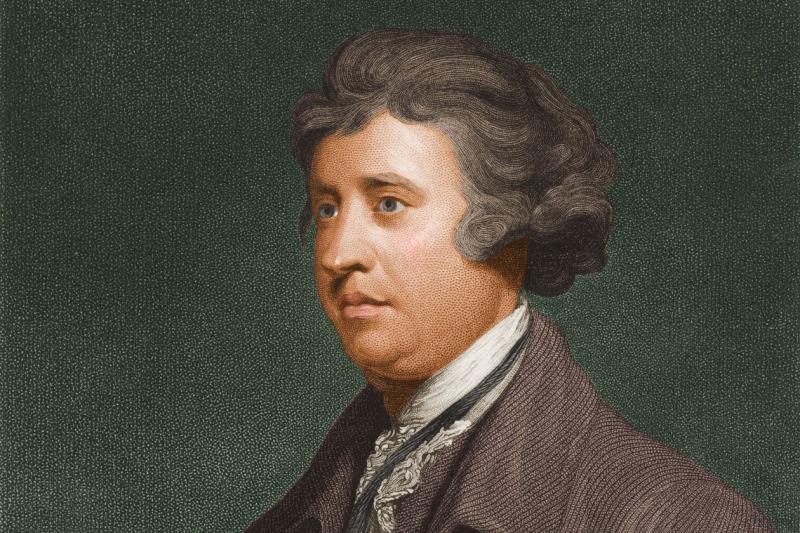'Commerce and Manners in Edmund Burke's Political Economy' Review: Tradition, Yes, and Markets Too - WSJ
By: James Grant (WSJ)



Prudence was the watchword of Edmund Burke, the great 18th-century Irish statesman, except where his own money was concerned. The West’s founding conservative lived his financial life on the edge of disaster. It was a mercy for him that members of Parliament were legally spared the rigors of debtors’ prison.
Money in the abstract was rather where Burke shone, especially in the pages of his immortal “Reflections on the Revolution in France,” published in 1790, a year after the fall of the Bastille.
It cost money to turn a nation upside down, and the sans culottes could scrape up only so much by melting down church bells and expropriating noble estates. Anticipating modern central-banking practices, the new French republic turned to the printing press. Its scrip, the infamous assignat, couldn’t hold a candle to the good-as-gold British pound, as Burke proceeded to demonstrate.
Liberty was the touchstone of English monetary arrangements, Burke’s argument ran. “Cash,” as gold was known, was the one and only legal tender. Of course, bank notes were handier than ingots, but nobody had to accept such IOUs (not even the Bank of England’s) in lieu of gold itself. Weighing the soundness of the issuing bank, an Englishman could choose one or the other.
Not so the Frenchman. The pure paper assignat was money by law. Modern readers will scarcely take exception to such a system, as they know no other. “This note is legal tender for all debts, public and private” is the legend stamped on every dollar bill.
To Burke, however, it was the very absence of coercion that crowned the English monetary regime. “They forget,” he wrote of the revolting French, “that, in England, not one shilling of paper money of any description is received but of choice; that the whole has had its origin in cash actually deposited; and that it is convertible at pleasure, in an instant and without the smallest loss, into cash again. Our paper is of value in commerce, because in law it is of none.”
Gregory Collins’s “Commerce and Manners in Edmund Burke’s Political Economy” is a deep study of the thought of the man who famously preferred the days of chivalry to the modern age of “sophisters, economists, and calculators.” The author sets out to answer a puzzling question: How could one and the same writer mourn the destruction of the French monarchy while espousing a set of economic ideas to which Adam Smith himself would gladly have signed his name?
Mr. Collins, a lecturer in politics and economics at Yale University, organizes his book by theme. There are sections on fiscal management, foreign trade, corporate governance, the American Revolution, Anglo-Irish commercial relations and, of course, the tumult in France. In episode by episode, with admirable consistency, Burke supported free markets over manipulated ones, though a forerunner of Ayn Rand he wasn’t. As the laws of commerce are the laws of nature, he laid it down, they are likewise “the laws of God.”
Burke, for many years a member of Parliament for the commercial hub of Bristol, decried the imprisonment of insolvent debtors and pushed for the abolition of regulations that unjustly barred Irish merchants from competing with English ones. Neither principled stand endeared him to his money-minded constituents. “Let Government protect and encourage industry,” Mr. Collins quotes his hero saying, “secure property, repress violence, and discountenance fraud, it is all they have to do. In other respects, the less they meddle in these affairs the better; the rest is in the hands of our Master and theirs.”
It’s not only Adam Smith that Burke’s writings call to mind. Long before the birth of Friedrich Hayek, the 20th-century author of “The Road to Serfdom,” Burke observed how much better things worked when clever bureaucrats stood aside to let the forces of supply and demand do their spontaneous work.
And although he amazed his parliamentary colleagues with the depth of his study of economic statistics, especially in the fraught matter of the East India Co. (whose governor general, Warren Hastings, he devoted seven years to impeaching), Burke also knew what statistics could not measure. “There is much gaiety, and dissipation, and profusion, which must escape and disappoint all the arithmetick of political economy,” wrote the politician whose literary gifts one eminent critic put in the rarefied class of “above mere talent.”
Mr. Collins helpfully carries the reader along with periodic summaries of Burke’s thought. He places Burke’s body of work in the context of 18th-century politics and philosophy, and he clearly shows that the arch defender of tradition and honor and religion was also a penetrating exponent of the ideal of free people and free markets.
There’s no mistaking this learned disquisition for a beach book. Mr. Collins devotes seven consecutive paragraphs to an exegesis of “natural” in the setting of 18th-century economics. The six pages he spends exploring Burke’s ideas about public granaries and the role of the commercial middleman may prompt the lay reader to recall that Samuel Johnson, who revered Burke, scarcely ever read a book straight through. Even so, don’t skip too much in this one. “An attempt to eliminate distinctions among men,” Mr. Collins memorably writes, “would be an attempt to eliminate man.”
Mr. Collins, who seems to have read at least a part of every book that could possibly bear on his subject, intentionally steers clear of Burke’s tangled personal finances. Interested students may turn to the second volume of F.P. Lock’s authoritative “Edmund Burke.” According to Mr. Lock, the guiding light of conservatism got into debt in his late 30s and never got out. The wealth he accumulated was instead the kind that no government can tax and no central bank can debase.
Mr. Grant, the founder and editor of Grant’s Interest Rate Observer, is the author of “John Adams: Party of One.”






